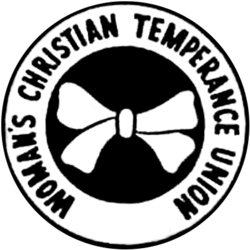Women's Christian Temperance Union

The Women's Christian Temperance Union was organized on November 18, 1874, in Cleveland, Ohio. [3] It quickly became the largest women's organization in the United States. The women in the movement were inspired by the serious drinking problem in the United States and the disproportionate ills that befell women whose husbands were drunkards. It was seen as both a moral and home issue, allowing women to join the political sphere in unprecedented ways. [3]
Men were barred from voting and holding office within the movement, though they were asked to contribute financially. [3]
The Women's Christian Temperance Union was founded by Annie Wittenmyer in 1874. In 1879 Frances E. Willard became the new president and remained president until her death. [5] The organization did not purely focus on temperance, but also promoted other social controls and the issue of equality for women. These other issues were part of Willard's “Do Everything” policy. [6]
The WCTU was united under a common leader, Willard, but had significant autonomy for local chapters. Willard often traveled the country to promote the WCTU and visit local chapters. [6] She visited Texas in 1882 [5] and California in 1883. [6] These visits inspired rapid membership growth. [6]

